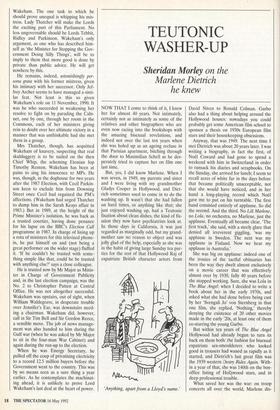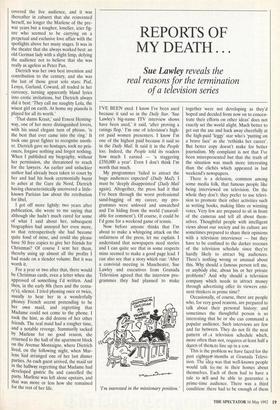TEUTONIC WASHER-UP
Sheridan Morley on the
Marlene Dietrich he knew
NOW THAT I come to think of it, I knew her for almost 40 years. Not intimately, certainly not as intimately as some of the relatives and other biographers who are even now racing into the bookshops with the amazing bisexual revelations, and indeed not over the last ten years when she was holed up as an ageing recluse in that Parisian apartment, bitching through the door to Maximilian Schell as he des- perately tried to capture her on film one last time.
But, yes, I did know Marlene. When I was seven, in 1949, my parents and sister and I were living with my grandmother Gladys Cooper in Hollywood, and Diet- rich sometimes used to come in to do the washing up. It wasn't that she had fallen on hard times, or anything like that; she just enjoyed washing up, had a Teutonic fixation about clean dishes, the kind of fix- ation they now have psychiatrists look at. In those days in California, it was just regarded as marginally odd, but my grand- mother saw no reason to object and was jolly glad of the help, especially as she was in the habit of giving large Sunday tea par- ties for the rest of that Hollywood Raj of expatriate British character actors from 'Anything, apart from a Lloyd's name.' David Niven to Ronald Colman. Garbo also had a thing about helping around the Hollywood houses: nowadays you could probably get some American film school to sponsor a thesis on 1930s European film stars and their housekeeping obsessions.
Anyway, that was 1949. The next time I met Dietrich was about 20 years later. I was writing a biography, in fact the first, of Noel Coward and had gone to spend a weekend with him in Switzerland in order to ransack his diaries and scrapbooks. On the Sunday, she arrived for lunch; I seem to recall acres of white fur in the days before that became politically unacceptable, not that she would have noticed, and in her hand a long-playing record which Noel gave me to put on his turntable. The first
band consisted entirely of applause. So did the second. And the third. No Lili Marlene, no Lola, no orchestra, no Marlene, just the
applause. Eventually all became clear. The first track,' she said, with a steely glare that denied all irreverent giggling, 'was my applause in Sweden. The next was my applause in Finland. Now we hear my applause in Australia.'
She was big on applause: indeed one of the ironies of the tactful obituaries has been the way they dwelt almost exclusively on a movie career that was effectively almost over by 1930, fully 40 years before she stopped working. Sure, she was Lola in
The Blue Angel: when I decided to write a book about her in the early 1970s, and
asked what she had done before being cast by her `Svengali Jo' von Sternberg in that one film, she replied, 'Nothing,' thereby denying the existence of 20 other movies made in the early '20s, at least one of them co-starring the young Garbo.
But within ten years of The Blue Angel Hollywood had already begun to turn its
back on them both: the fashion for bisexual expatriate sex-smoulderers who looked good in trousers had waned as rapidly as it
started, and Dietrich's last great film was the 1939 western Destty Rides Again. With- in a year of that, she was 140th on the box- office listing of Haywood stars, and in deep professional trouble.
What saved her was the war: on troop concerts all over the world, Marlene dis- covered the live audience, and it was thereafter in cabaret that she reinvented herself, no longer the Marlene of the pre- war years but a tougher, lonelier, icier fig- ure who seemed to be carrying on a perpetual and exclusive love affair with the spotlights above her many stages. It was in the theatre that she always worked best: an old German lady with a slight limp, defying the audience not to believe that she was really as ageless as Peter Pan.
Dietrich was her own best invention and contribution to the century, and she was the last of those great solo stars: Piaf, Lenya, Garland, Coward, all traded in her currency, turning apparently bland lyrics into erotic invitations, but Dietrich always did it best: 'They call me naughty Lola, the wisest girl on earth. At home my pianola is played for all its worth.'
'That damn Kraut,' said Ernest Heming- way, one of her more distinguished lovers, with his usual elegant turn of phrase, 'is the best that ever came into the ring.' It took one great fighter to recognise anoth- er. Dietrich gave no hostages, took no pris- oners, forgave nothing and forgot nothing. When I published my biography, without her permission, she threatened to reach for the lawyers. An earlier and unluckier author had already been taken to court by her and had his book ceremonially burnt to ashes at the Gare du Nord, Dietrich having characteristically uncovered a little- known Parisian law about the retribution for libel.
I got off more lightly: two years after publication, she wrote to me saying that although she hadn't much cared for some of what I said about her, subsequent biographies had annoyed her even more, so that retrospectively she had become quite fond of mine, and could she please have 50 free copies to give her friends for Christmas? Of course I sent her them, thereby using up almost all the profits I had made on a slender volume. But it was worth it.
For a year or two after that, there would be Christmas cards, even a letter when she approved of something I'd written. And then, in the early 80s (hers and the centu- ry's), silence. I tried phoning once or twice, usually to hear her in a wonderfully phoney French accent pretending to be her own maid, and regretting that Madame could not come to the phone. I took the hint, as did dozens of her other friends. The real maid had a rougher time, and a notable revenge. Summarily sacked by Marlene for no good reason, she returned to the hall of the apartment block on the Avenue Montaigne, where Dietrich lived, on the following night, when Mar- lene had arranged one of her last dinner parties. As each guest arrived, the maid sat in the hallway regretting that Madame had developed gastric flu and cancelled the party. Marrene was left alone upstairs, and that was more or less how she remained for the rest of her life.



















































 Previous page
Previous page